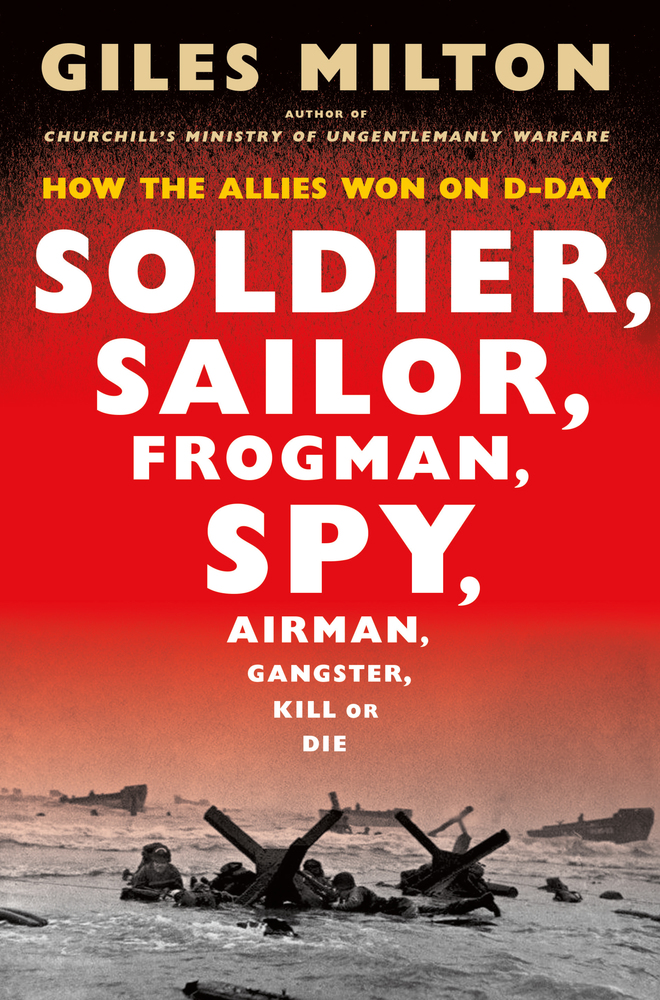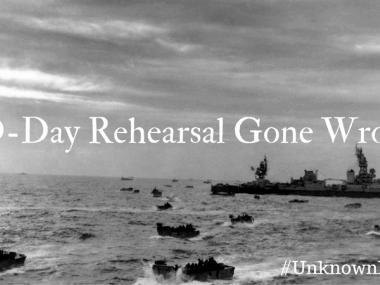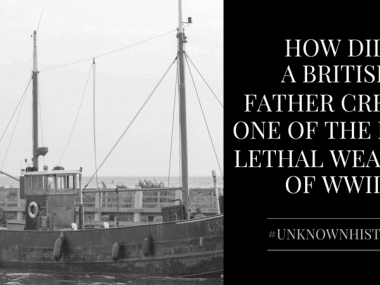D-Day: The Tale of Two Brothers
Two brothers, Charles and Elliot Dalton, fought side-by-side on the morning of June 6, 1944, leading the Juno Beach landings.
Who were Charles and Elliot Dalton?
Welcome to Season 3 of Unknown History: D-Day Stories. I’m your host, Giles Milton, and today we’re talking about an extraordinary true story that took place on Juno Beach.
Buy Now

For those Unknown History listeners who’ve seen Steven Spielberg’s film, Saving Private Ryan, you’ll know that the plot turns on the story of three brothers killed in action while serving in the US army, with a fourth about to head to Normandy for the D-Day landings.
Spielberg’s story is fiction, but it could have been fact. There were many brothers serving on D-Day, creating huge anxiety for the worried families at home.
Among the more remarkable stories is that of Charles and Elliot Dalton, two Canadian brothers, who shared the misfortune of having to land in the first wave on Juno Beach. They were due to land together, shortly before 8 a.m. on the morning of D-Day. And as with everything on D-Day, their landings would not go as planned.
“You’re a phoney if you’re not afraid. The only thing that’s going to keep you going is that you’re afraid of being afraid.”
Charles and Elliot were extremely close. Charles was 33-years-old and more than half a decade older than his sibling, but the age gap had done nothing to dampen the deep affection they had for one another—two grinning brothers with rugged faces and swept-back hair. Charles had flashing teeth and a winning smile. “The archetypal dashing young officer,” said one under his command. “He really had a lot of style.”
Elliot was more earnest and more youthful. He had followed in his brother’s footsteps by joining the same regiment in 1931. They were known by their men as Mark I and Mark II: each was held in equal regard.
The brothers were so close to each other, as they were to their mother, that Charles had begged his commanding officer to spare Elliot the initial assault. “Don’t send Elliot on the first wave,” he said. “You know what it will do to our mother if we both die.” But there was nothing the commanding officer could do. It had already been decided that both brothers would be among the first to storm the beach.
All brothers have a built-in spirit of rivalry and Charles and Elliot were no different: they had competed all their lives. Now, they were facing the greatest competition of all—to survive the run-in to the sea wall and then fight their way into Bernières-sur-Mer.
Elliot was the first to admit he was driven by fear. “You’re a phoney if you’re not afraid,” he said to his men. “The only thing that’s going to keep you going is that you’re afraid of being afraid.”
His older brother Charles also confessed to being scared—it was only natural. “Of course, you’re always frightened.”
But he also knew not to reveal that fear to his men. He felt an acute sense of responsibility, perhaps because he had played the role of responsible elder brother for much of his life.
When the two men parted company in order to prepare for the 3:15 a.m. reveille, they knew in their hearts that they might never see each other again. Charles shook his brother’s hand warmly, if a little stiffly. “See you on the beach!” He said it with forced jollity, but the lump was firmly in his throat. It was hard to be light-hearted at such a moment.
“Move! Fast! Don’t stop for anything. Go! Go! Go!”
All five beach landings on D-Day were extremely dangerous, but Juno Beach presented an additional hazard. Unlike Utah and Omaha, the men would be coming ashore in a town, Bernières, and would almost certainly have to fight their way through heavily defended streets—house-to-house combat in which every door might be booby-trapped and every attic conceal a sniper.
One of Charles Dalton’s men, Charlie Martin, was praying that Allied bombers would knock out the German shore defenses, but when he peered over the ramp of his landing craft, he was alarmed to see “a formidable 15-foot wall with three large heavy cement pill-boxes.” Worse still, “the entire beach was open to murderous fire,” with machine guns positioned in such a way as to cover every inch of foreshore.
As they neared the shore, there was no time to reflect on these dangers. The first landing craft were already entering the coastal shallows and they soon scrunched into the gravel and came to a halt in a few inches of water.
“Down ramp.”
“Move! Fast! Don’t stop for anything. Go! Go! Go!”
Charles Dalton’s B Company faced a tough reception. “Follow me!” yelled Dalton, only to disappear in 12 feet of water. By the time he had made it ashore, most of his men had been hit.
One of his men, young Doug Hester, watched three of his comrades jump off the ramp into knee-deep water. All were gunned down in an instant. Hester found himself jumping into seawater that was frothing and pink, colored by “their rising blood.”
He surged forward under fire and caught up with his friend, John ‘Gibby’ Gibson, just as a burst went through Gibby’s backpack.
“That was close, Dougie,” he said with a grin.
The next burst killed him. “He fell down spread-eagled in front of me.”
When Charles Dalton glanced back towards the sea, he saw that most of his men were lying on the sand. “I thought they’d gone to ground for cover, then realized they’d been hit.”
Dalton had by now reached his objective, an enemy pillbox. But when he fired his Sten gun through the aperture, he was met by the bullet of a 9mm German revolver. The bullet went straight through his helmet, tracing the outline of his skull and peeling back his scalp, but mercifully avoiding his brain. It sent a cascade of blood down his face. Weakened by the wound, Dalton urged his surviving men to knock out the seafront pillboxes and press on into Bernières.
“We kicked in the door, tossed in a grenade, charged in quickly, guns blazing, while the defenders were stunned.”
Charles Dalton had so far received no news from his brother’s company. He had no idea if young Elliot was still alive. In fact, Elliot Dalton’s men had experienced a somewhat less chaotic landing, although they had nevertheless come under heavy fire from the German machine guns.
One of his lads, Charlie Martin, had pitched himself forwards from the landing craft, only to see his three friends, Hugh ‘Rocky’ Rocks, George Dalzell, and Gil May, cut down by bullets.
One of the landing craft took a particularly cruel hit, with 28 of the 35 men gunned down on the beach. But Elliot Dalton himself survived the run-in and now rallied the survivors at the sea wall, encouraging them to attack the concrete pillboxes.
Taking charge of a precarious situation, he led a small band of men along the rubble-strewn seafront towards a fin-de-siècle villa being used as a strongpoint. Three years of training now proved their worth.
“We kicked in the door, tossed in a grenade, charged in quickly, guns blazing, while the defenders were stunned.” There was no time for taking prisoners: the men shot everything that moved.
One by one the shoreline pillboxes were silenced, enabling the bruised survivors to push forward into the streets of Bernières. They now embarked on the most dangerous form of warfare, fighting at close quarters and with danger lurking in every building.
“Crouching low,” said one of the men, “with our Sten automatics at the immediate alert, we ventured a little further away from the protection of a burned out tank.”
They hugged the low walls that surrounded the houses and pushed on into town. There was no sign of life: it was as if every civilian had fled. Only when the men of A Company attacked what they believed to be a German communications centre did they learn, to their astonishment, that Bernières was full of people.
“We opened fire and, with that, a big gold ball on the end of a flagpole started to come out of the basement window.” The men kept on firing, assuming it to be a ruse, but next “an enormous French flag came out of the window.” Elliot Dalton ordered his men to stop shooting. As he did so, “around 70 French people came out of the cellars with their hands up.” Every one of them was a pensioner. Elliot found himself smiling, for the scene was darkly comic. “My chance for a VC went down the drain with attacking 70 elderly French people hiding in the basement.”
His flight of good humor was to be abruptly shattered. A runner came to him with the dreadful news that his brother Charles had been killed. He had put up a stiff fight on the beach and displayed great bravery, but the German resistance had proved too strong. Charles had died of his wounds.
Elliot was devastated—it was a gut-wrenching loss—but this was no time to dwell on the tragedy. Men’s lives were at stake. He needed to lead. “While I grieved,” he said, “I had a job to do and had to carry on.” It was nonetheless a devastating blow. After a lifetime of competing with his brother, he had just won the most bitter of prizes.
To the lads fighting their way through Bernières, it felt as if they were engaged in a desperate guerrilla war in which there was no sense of order.
“Do not stop till you reach the objective. Otherwise, once you’re stopped, you are 90% defeated.”
Each of the ten boatloads had become an independent fighting unit and none had connection with the other. Yet the two Daltons had done a magnificent job in training their men and Elliot’s order rang clear in the ears of all in A Company. “Do not stop till you reach the objective. Otherwise, once you’re stopped, you are 90% defeated.”
And so forward they went, pushing ever deeper into the rubble-strewn streets of Bernières, amid burning houses and exploding shells. Huge numbers of men and machines were soon pouring into Bernières. The Queen’s Own Rifles were followed by one of the French- speaking regiments.
So many tanks were ploughing through the town that they were having problems maneuvering around the tight corners. Joe Wagar watched one tank “trying to negotiate a narrow turn in a street, tearing off the corner of a building and not stopping.”
Elliot Dalton spent much of the morning fighting against stiff German resistance. “House fighting was harder than anticipated. They hung in there and were difficult to get out of the houses.” But he and his men flushed through every building until the whole town had been liberated. Soon, they could begin the push inland.
Elliot would continue his fight for several more days, aware that he was doing it not only for himself but also in memory of his beloved brother. He would eventually be wounded and sent back to England to be hospitalized. When the nurse wheeled him to the bed marked “Major Dalton,” she noticed a patient already lying there with a sheet pulled over his head. She asked what he was doing there, prompting him to sit bolt upright and reply, “I’m Major Dalton.” It was Elliot’s brother Charles: miraculously still alive, having survived the head wound he received on the beach.
I hope you’ve enjoyed this episode of Unknown History. In the next episode, we’ll be hearing the incredible story of William Petty’s Bastards—the toughest of Rangers whose task was to capture the big German guns at Pointe du Hoc.






